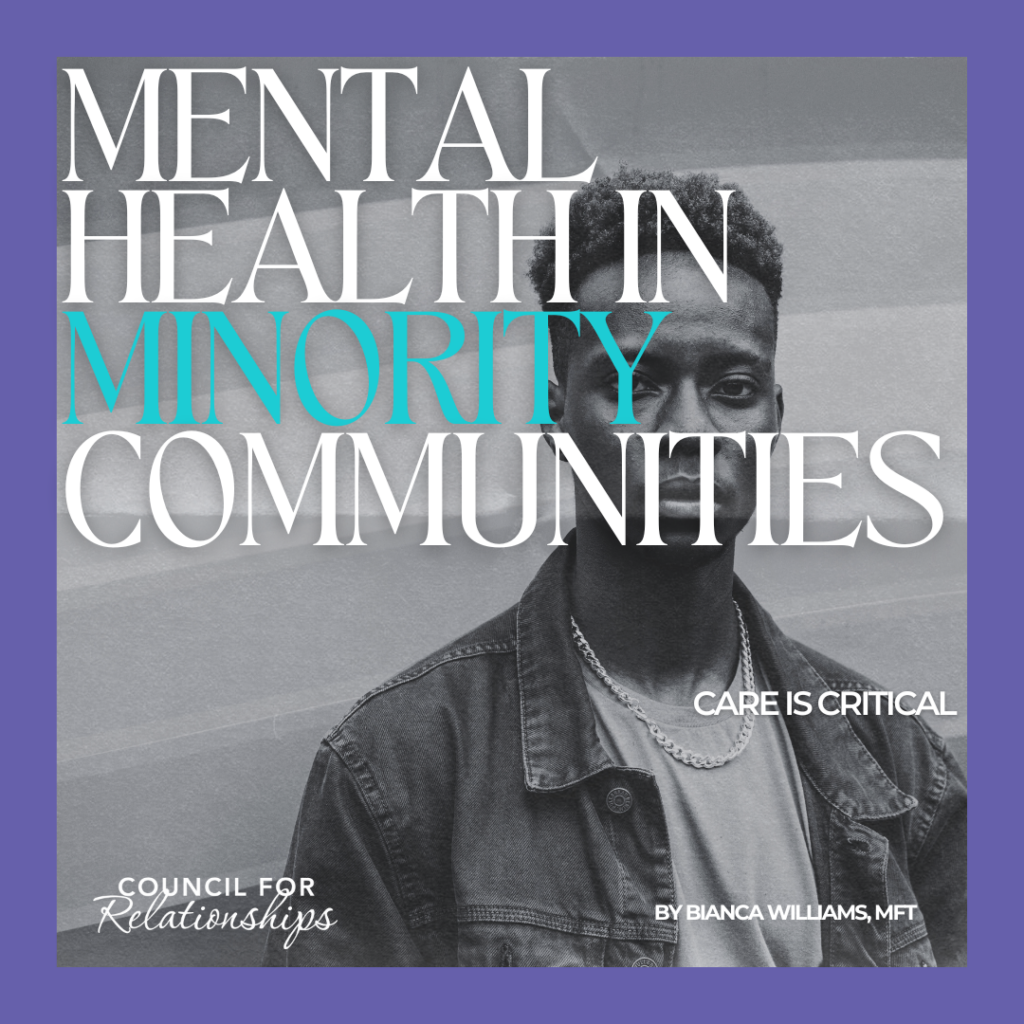Mental Health in Minority Communities: Care is Critical
Bianca Williams, a dedicated clinician at Council for Relationships, emphasizes the importance of normalizing all feelings and emotions for her clients. Mental health in minority communities is a critical issue, and this blog aims to shed light on the unique challenges and stigmas that exist within these communities. Bianca shares her personal and professional insights to help readers understand the importance of mental health care and the steps we can take to support mental and physical health in minority communities.

Request a therapy appointment with Bianca Williams, MFT.
The Importance of Normalizing Emotions
As a clinician, I must normalize all the feelings and emotions that my clients are experiencing. One of the best gifts we can offer each other is a sense of connectedness, a message that says, “You are not alone in this.”
As a clinician at the Council for Relationships, I have seen what topics and issues matter most in mental health and wellness. In 2020, the world stopped when COVID-19 became an official pandemic. For better or worse, we had to remain indoors, surrounded by loved ones.
During that time, one thing became certain: individuals, parents, partners, and family members had to look deeper and start addressing things that didn’t feel right.
Reflections on Emotional Expression and Family Messages
In the therapy room, I often hear about my clients’ early experiences with emotional expression in their families. Some clients witness the overwhelming impact of their parent’s feelings, like seeing a parent who struggles with depression and spends a lot of time in bed. They may grow to feel responsible for other people’s feelings because they learned to take on the role of trying to help their parents. (Parents, it is important to be mindful of how much of and how you share your struggle with your children!).
On the other hand, some clients experience a parent who never showed complicated feelings or emotions, leaving their young brain to conclude that having or expressing feelings was unacceptable. This illustrates how messages are learned and how narratives become ingrained in our brains. It’s essential to recognize that we can rewrite how we react toward ourselves and interact with others.
Stigmas around mental illness still exist, especially in communities of color. According to the National Council for Mental Wellbeing, long-held beliefs like “God only gives you what you can handle” and “asking for help puts your business out there” only perpetuate the taboo.
Knowledge of the history of trauma and struggles experienced by elders in communities of color might lead some African Americans to internalize the belief that they have no room to talk about their problems. When this is coupled with parental messaging around “grinning and bearing it” or “picking yourself up by the bootstraps,” that shutting down of emotional expression becomes reinforced.
If the parent cannot tolerate their child’s feelings due to their own trauma, they may further reinforce it by saying things like “Do you need something to really cry about?” or “Stop whining.”
This highlights the importance of having access to resources that promote the sharing and understanding of intergenerational trauma and its impact on mental and physical health.
The Impact of Historical Trauma on Mental Health in Minority Communities
McLean Hospital in Belmont, Massachusetts, is known for its work in mental health care, research, and education. For example, they highlight stress’s effects on reproductive cells and the uterus. This means that descendants of people who experienced trauma may already be vulnerable to mental health conditions like anxiety and depression.
Consider the mental health implications for descendants of people, including Black Americans, who have experienced enslavement, severe poverty, and extreme violence. According to the World Health Organization, although African American adults are 20 percent more likely to report serious psychological distress than white adults, only one in three African Americans who struggle with mental health issues will receive appropriate treatment. This directly correlates with the stigma that still exists in this community.
Despite these challenges, I see positive changes on the horizon and up close. The number of individuals of color reaching out for support is growing, and conversations about the delays in seeking help are happening. Understanding that life’s daily events come with triumphs and tribulations is important.
Having a few bad days doesn’t make you depressed any more than having a few angry days makes you emotionally unstable. Feeling overwhelmed and anxious is normal and does not mean you have anxiety. What it does require is that you slow down, recognize the feelings and emotions you’re experiencing, and understand why you may not have paid them the attention they deserve.
Steps to Improve Mental Health in Minority Communities
The next step I recommend is to optimize. This means permitting yourself to do some work. If it involves reaching out to an organization like Council for Relationships to discuss what’s happening in your environment, I highly encourage it. That’s what we’re here for.
Optimizing might also involve a trip to the bookstore to pick up fact-based materials that help you understand certain behaviors or thoughts, especially regarding the frequency of symptoms—an essential aspect of a professional diagnosis.
At the end of the day, no matter your background, backstory, or skin color, grace and compassion for oneself are fundamental. Only then can the journey for true acceptance and healing begin.

Bianca Williams, MFT (pictured here)
About Philadelphia Therapist Bianca Williams, MFT
Bianca Williams, MFT is a dedicated therapist at CFR. She is committed to helping clients achieve their goals and find their path to well-being. Her unique background, empathetic approach, and unwavering support make her an invaluable team member.
If you’re in Pennsylvania and seeking therapy, consider contacting Bianca. Whether you prefer in-person sessions at our University City Philadelphia office or the convenience of online therapy, Bianca is here to support you on your journey.
Please visit her CFR profile for more information or to schedule an appointment with Bianca Williams. You can also request a therapy appointment with one of our 85 other therapists.
If this is an emergency, please call 911 or contact the National Suicide Prevention Lifeline by dialing 988.
More Mental Health Blogs from CFR Therapists & Psychiatrists
CFR’s therapists, psychiatrists, and other mental health professionals offer much more to explore! Check out the CFR Expert Voices blog for great mental and emotional health advice on managing your anxiety, spirituality in the therapy room, improving your relationships, tips for healing from a traumatic experience, and much more. To get first access to our Expert Voices blog, join our mailing list!
Check out these other blogs by CFR clinicians on mental health in minority communities:
Closing the Gap: Perinatal Mental Health Services in North Philadelphia
Queerplatonic Relationships & Questioning Romantic Hierarchy
